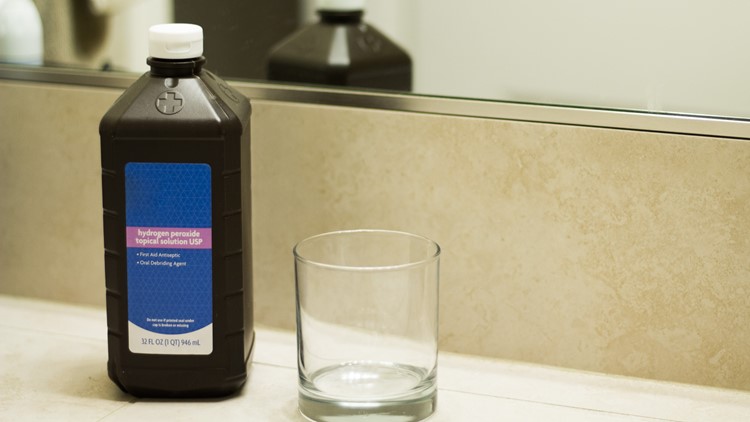Hydrogen peroxide is a chemical that has many uses around the house, including cleaning, disinfecting, and stain removal. It can also be used to wash produce and even whiten carpets.
In the past, many people used hydrogen peroxide to treat minor cuts and scrapes. But VERIFY found that health experts now warn against using it to clean wounds because it can irritate the skin and kill healthy cells.
After VERIFY fact-checked why people shouldn’t use hydrogen peroxide on wounds anymore, the team got multiple questions about the safety of using hydrogen peroxide for other reasons. VERIFY viewer Thelma specifically asked whether it’s safe to gargle with hydrogen peroxide. Another viewer asked if it is okay to use hydrogen peroxide as a mouth rinse.
THE QUESTION
Is it safe to gargle with hydrogen peroxide?
THE SOURCES
- Cleveland Clinic
- Williams, Daily & Frazier Dental, family and cosmetic dentist office in Raleigh, North Carolina
- Callan White, DDS, general dentist at Asheville Family Dentistry in Asheville, North Carolina
THE ANSWER
It is safe to gargle with hydrogen peroxide if it’s been diluted with water.
WHAT WE FOUND
Dentists often recommend using hydrogen peroxide to improve oral health, according to Williams, Daily & Frazier Dental. In a blog post, the Raleigh, North Carolina-based dental office explains that gargling with hydrogen peroxide as a mouth rinse can help with several oral health issues, including reducing gum inflammation, especially when combined with brushing and flossing, and it can help soothe a sore throat. Many people also use hydrogen peroxide as a mouth rinse because it can help whiten teeth.
But Cleveland Clinic and Williams, Daily & Frazier Dental both say gargling with hydrogen peroxide is only safe to use as a mouth rinse if it is diluted with water first. It is also safe to use store-bought mouthwash that contains hydrogen peroxide, Cleveland Clinic says.
“To maximize the effects of hydrogen peroxide – and to use it safely – you must first dilute it,” Williams, Daily & Frazier Dental writes on its website. “The familiar brown bottle found in stores contains 3% hydrogen peroxide, which is too strong for oral use.”
More from VERIFY : No, it’s not safe to mix bleach with other household cleaners
Callan White, a general dentist at Asheville Family Dentistry, also told VERIFY it is safe to use diluted hydrogen peroxide as a mouth rinse as long as people “focus on the concentration and duration of use.”
To create a mouth rinse, you should dilute hydrogen peroxide from 3% to 1% by mixing two parts water with one part hydrogen peroxide. Williams, Daily & Frazier Dental says you can also mix ½ cup of water with ¼ cup of 3% hydrogen peroxide to make a 1% hydrogen peroxide rinse that is safe to gargle. Anything stronger than that is likely to cause mouth irritation, according to White.
“A higher concentration of hydrogen peroxide is not ideal, and long-term use at a higher concentration is not beneficial at all, and actually can start to harm tissue there,” White said.
More from VERIFY : No, you cannot inhale or ingest hydrogen peroxide to treat COVID-19
Once you have gargled with diluted hydrogen peroxide for about 60 seconds, you should spit it out immediately – do not swallow it. That’s because swallowing hydrogen peroxide can irritate the tissues in your throat, according to Williams, Daily & Frazier Dental.
“Swallowing undiluted hydrogen peroxide can even burn the organs of your digestive tract and cause bleeding there,” Williams, Daily & Frazier Dental says. “Swallowing even a small amount of diluted hydrogen peroxide can cause stomach pain and possible vomiting.”
While there are some risks associated with gargling diluted hydrogen peroxide, such as potential mouth irritation, using it as a mouth rinse can provide some additional oral health benefits, such as helping to fight periodontal (gum) disease or gingivitis, when used in combination with brushing and flossing.
“It's a very easy cost-effective way to help yourself out with mouth rinses or gargling,” White said.
More from VERIFY: No, you should not use hydrogen peroxide on wounds



